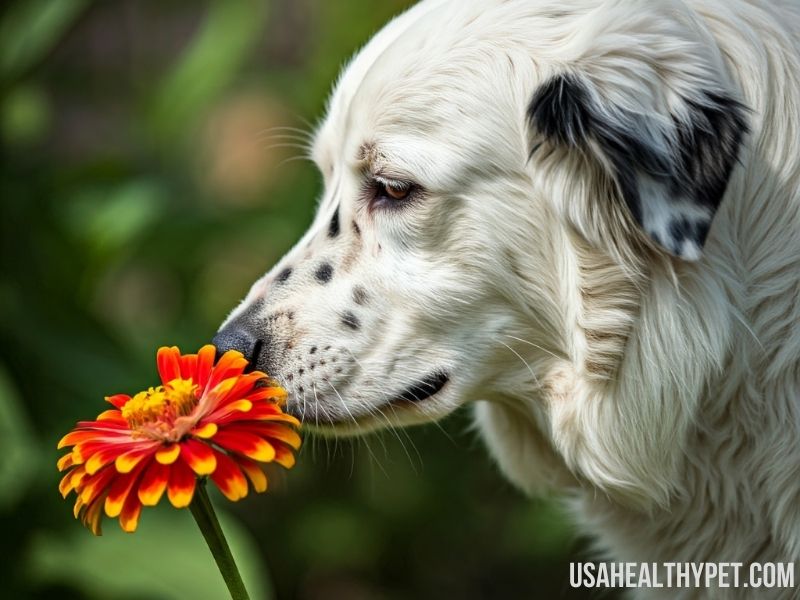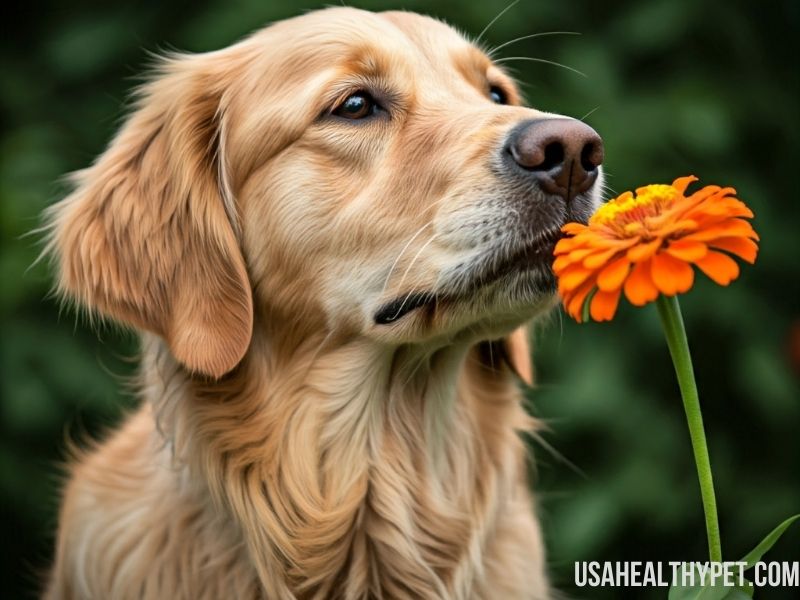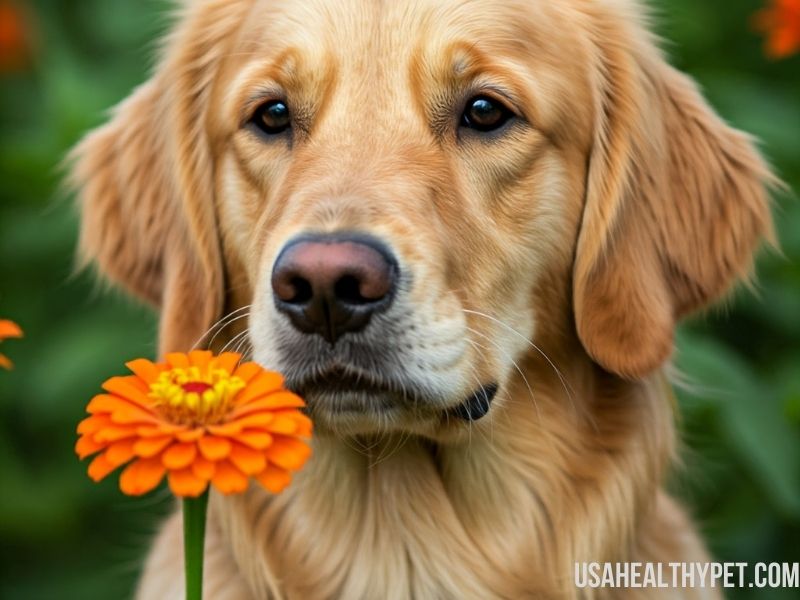Zinnias are a popular and vibrant flower that many of us love to have in our gardens. They brighten up any outdoor space with their bright colors and are known for being easy to grow.
But as dog owners, we always have to ask ourselves: are zinnias safe for our furry friends? If you’ve ever wondered whether your dog is in danger from zinnias, you’re not alone.
Let’s dive into this common concern and find out if these flowers pose any threat to your dog.
What Are Zinnias?
Zinnias are colorful, cheerful flowers that come in various colors, ranging from reds to yellows, purples, and even whites. They are loved by gardeners because they are low maintenance and thrive in sunny spots.
These flowers can grow tall, with some varieties reaching up to three feet, making them a stunning addition to any flower bed.
But while they look beautiful, the real question for dog owners is whether these bright blooms are harmful to pets.
Are Zinnias Toxic to Dogs?
Good news! Zinnias are not toxic to dogs. That’s right – if your dog happens to nibble on a zinnia or two while playing in the yard, there’s no need to panic.
Unlike some other common garden plants, zinnias don’t contain any harmful chemicals that could make your dog sick.
The American Society for the Prevention of Cruelty to Animals (ASPCA) lists zinnias as non-toxic to both dogs and cats, making them a great choice for pet-friendly gardening.

Why Pet Owners Worry About Plant Toxicity
We all know dogs can be curious creatures, often exploring the world with their mouths. Whether it’s a new plant in the yard, a shoe, or even your garden hose, dogs will often chew on things they shouldn’t.
This can lead to understandable concern when it comes to plants because many popular varieties are actually harmful to pets.
Many of us have heard horror stories of dogs getting sick from common household plants. It’s natural to be worried, and you’re right to be cautious!
But zinnias are one of the safe ones, so if you love having them in your garden, you’re in the clear.
Lisa Steele, an expert on sustainable gardening, suggests, “Zinnias are perfect for gardens where pets roam. They’re bright, resilient, and safe for dogs, making them a top choice for pet owners who want a colorful but worry-free garden.
What Happens if a Dog Eats Zinnias?
In most cases, absolutely nothing will happen. Zinnias are generally safe for dogs to ingest. They don’t contain toxins that could harm your dog, so you don’t have to worry about any immediate danger.
However, that doesn’t mean you should encourage your dog to snack on them. Even though zinnias aren’t poisonous, they could still cause mild stomach upset if eaten in large amounts.
Much like how we might feel after eating too much candy, your dog could experience a mild case of diarrhea or vomiting – but this is rare and usually nothing serious.
Signs Your Dog Might Have Eaten Something Toxic
If you’re unsure whether your dog ate zinnias or something else, it’s always good to know the common signs that they’ve ingested a harmful plant. Keep an eye out for:
- Vomiting
- Diarrhea
- Lethargy
- Drooling
- Loss of appetite
- Difficulty breathing
If you notice any of these signs, it’s best to consult with your vet right away, especially if you’re not certain about what your dog might have chewed on.

What Should You Do If Your Dog Eats Zinnias?
If your dog decides to take a bite of a zinnia, don’t panic! In most cases, they’ll be completely fine. Just keep an eye on them for any signs of an upset stomach, such as vomiting or diarrhea.
If those symptoms appear, they will likely pass on their own within a day. Offering water and bland food can help your dog feel better, but if symptoms persist, it’s always a good idea to check in with your vet for advice.
Safe Plants for Dogs
If you’re a gardening enthusiast, you’ll be happy to know there are several dog-safe plants you can grow alongside your zinnias. Some examples include:
- Marigolds
- Petunias
- Sunflowers
- Snapdragons
- Roses
These plants are all non-toxic and safe to have around your dogs, making them perfect for a pet-friendly garden.
Plants That Are Toxic to Dogs
While zinnias and other plants are safe, many common plants are not. It’s essential to be aware of the plants that could pose a risk to your pets. Some toxic plants include:
- Lilies
- Daffodils
- Tulips
- Oleander
- Azaleas
- Sago palms
Even a small nibble on these plants could cause serious harm to your dog, so it’s best to avoid them in your yard.
How to Prevent Your Dog From Eating Plants
If your dog loves to munch on plants, there are ways to keep them from doing so. First, you can fence off certain parts of the garden, especially areas with potentially toxic plants.
You can also use pet-safe sprays that deter chewing or plant thorny bushes as a natural barrier.

Training Tips to Keep Dogs Away From Plants
Training is a crucial part of keeping your dog safe. Teaching commands like “leave it” or “stay” can be effective in preventing your dog from chewing on plants.
Start by rewarding your dog for ignoring plants during walks or playtime in the yard. Consistency is key, and soon your dog will understand which areas are off-limits.
Creating a Dog-Friendly Garden
Designing a dog-friendly garden means choosing safe plants, creating pathways where your dog can roam, and setting up shaded areas where they can relax.
Raised flower beds or hanging planters are also great ways to keep plants out of reach while maintaining a beautiful garden.
Common Misconceptions About Plant Safety
Many people think that just because a plant is natural, it’s safe for pets. However, plenty of natural plants can be harmful to dogs.
Always do your research before adding new plants to your home or garden, especially if your dog is prone to chewing on them.
When to Call the Vet
While zinnias are safe, it’s important to act quickly if you suspect your dog has eaten something toxic.
If you notice sudden changes in behavior, vomiting, or any unusual symptoms, it’s time to call the vet. It’s always better to be safe than sorry when it comes to your pet’s health.
Conclusion: Are Zinnias Safe for Dogs?
Yes, zinnias are absolutely safe for dogs. These bright, vibrant flowers can add a splash of color to your garden without posing any risk to your furry friends.
However, it’s still essential to monitor what your dog eats to avoid any mild stomach upset. Stick with pet-friendly plants like zinnias, and you’ll have a beautiful garden and a happy, healthy dog.
FAQs
1. Can zinnias make my dog sick?
Zinnias are not toxic to dogs. While they might cause mild stomach upset if eaten in large amounts, they generally don’t pose any serious risks.
2. What should I do if my dog eats a zinnia?
If your dog eats a zinnia, monitor them for any signs of vomiting or diarrhea. Most dogs will be just fine, but if symptoms persist, contact your vet.
3. Are there any other safe flowers I can plant with zinnias?
Yes! Marigolds, petunias, snapdragons, and sunflowers are all safe options for your dog-friendly garden.
4. How can I keep my dog from eating plants in the yard?
Training, barriers, and pet-safe deterrent sprays can help prevent your dog from chewing on plants.
5. What are some common toxic plants I should avoid?
Be cautious of lilies, daffodils, tulips, oleander, and sago palms, as these can be harmful to dogs.
